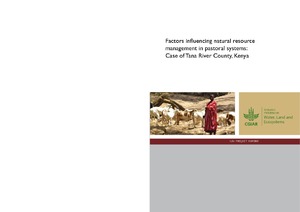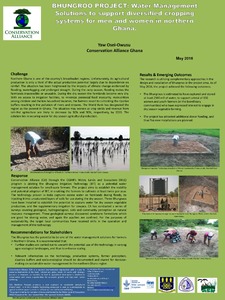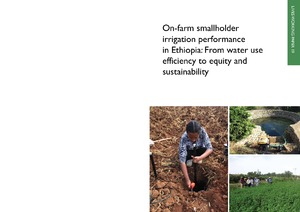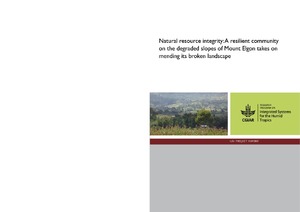Estimating water balance of Tegona watershed in southeastern Ethiopia, using SWAT model
Water resource development is certainly the basic and crucial infrastructure for a nation’s sustainable development. To utilize water resources in a sustainable manner, it is necessary to understand the quantity and quality in space and time. This study was initiated with the objective of evaluating the performance and applicability of the Soil and Water Assessment Tool (SWAT) in analyzing the influence of hydrologic parameters on the stream flow variability and estimation of monthly water yield at the outlet of Tegona river watershed in Bale mountainous area..
Freshwater, Fish and the Future
This publication is a compilation of presentations and recommendations resulting from the Global Conference on Inland Fisheries: Freshwater, Fish and the Future, convened at FAO HQ in January 2015 and is part of an MOU signed with Michigan State University. Contents include scientific papers on inland fisheries from a global perspective that cover biological and socio-cultural assessments, drivers and governance issues. Ten steps to responsible inland fisheries are included along with recommendations for their implementation.
Water Commons Influencing Practice
Rajasthan (India) has been a pioneer state in terms of policy and practice in water conservation and management. The ongoing water stress in Rajasthan has triggered serious thinking,in particular on micro action, that can contribute to Mukhya Mantri Jal Swavlambhan Abhiyan (MJSA) thinking. FES and Hindustan Unilever Foundation are sharing the report with a view to illustrate one possible trajectory for a collaborative action involving private sector, civil society organisation and the government.
Bhungroo Project: Water management solutions to support diversified cropping systems for men and women in Northern Ghana.
On-farm smallholder irrigation performance in Ethiopia: From water use efficiency to equity and sustainability
Natural resource integrity: A resilient community on the degraded slopes of Mount Elgon takes on mending its broken landscape
The once beautiful foothills of Mount Elgon, in eastern Uganda are today seriously degraded, with excessive water run-offs and landslides becoming regular occurrences. Restoring the health and productive potential of the agroecosystem had become a dire need of those, mostly women, who stayed to farm it. By challenging the status quo and doing things differently, the Kapchorwa District Landcare Chapter (KADLACC) has been helping this farming community over the past fifteen years to manage its natural resources more sustainably, as well as more profitably.
Water Woes Put a Damper on Myanmar’s Surging Economy
The central plains of Myanmar, bordered by mountains on the west and east, include the only semi-arid region in South East Asia – the Dry Zone, home to some 10 million people. This 13 percent of Myanmar’s territory sums up the challenges that the country faces with respect to water security: an uneven geographical and seasonal distribution of this natural resource, the increasing unpredictability of rain patterns due to climate change, and a lack of water management strategies to cope with extreme weather conditions.
Water Security Critical for World Fastest-Growing Economy
Lack of water management and limited access to data risk hindering Myanmar’s economic growth, making water security a top priority of the new government.
Climate change and increased urbanisation, along with earthquakes, cyclones, periodic flooding and major drought, require an urgent infrastructural upgrade if the country is to undergo a successful integration into the global economy after five decades of economic isolation under military rule.
Reducing Marine and Coastal Pollution
The West African coastline is home to
major industries, mining activities, peri-urban and
agro-industry, and tourism, as well as urban and seaside
residences, all of which generate waste and cause pollution.
Many areas along the coast also lack adequate wastewater and
solid waste management systems. As a result, large volumes
of untreated wastewater and solid waste are dumped into the
open, polluting the land and water. Water quality studies








